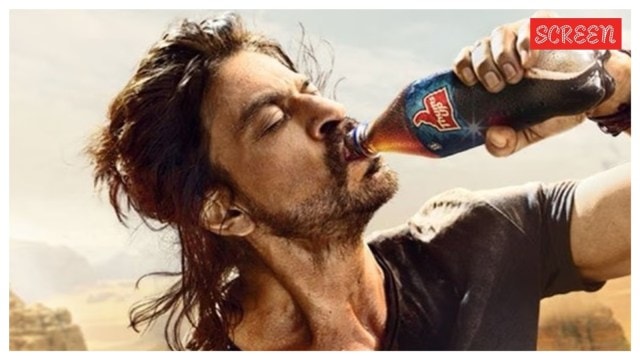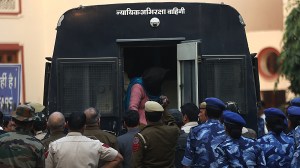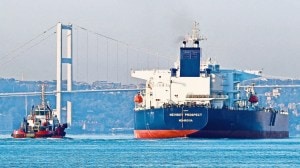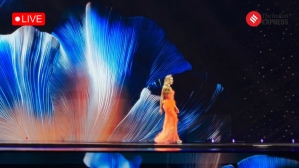Click here to follow Screen Digital on YouTube and stay updated with the latest from the world of cinema.
Brand Shah Rukh Khan: The apex liberator who went on to become the living archive of India’s ambition
Shah Rukh Khan has been the face of over 30 brands over the years, earning Rs 5 to 10 crore from each endorsement. What makes him such an appealing brand ambassador? On the star's 60th birthday, SCREEN talks to ad gurus and industry insiders to decode his enduring reign.
 Shah Rukh Khan in Thums Up advertisement.
Shah Rukh Khan in Thums Up advertisement.Before Shah Rukh Khan went full throttle looking for love (read: Koi na koi chahiye pyaar karne wala) in his 1992 big-screen debut Deewana, he had already entered our homes and hearts with intimate television shows like Fauji and Circus on DD National. If watching him as Abhimanyu Rai and Shekharan Rai respectively wasn’t enough, we also relished quick glimpses of him in blink-and-miss commercials in between.
Back in 1998, we saw a 24-year-old Shah Rukh adjusted his headband and gave a hat tip to Sylvester Stallone’s ultimate underdog Rocky Balboa as Survivor’s definitive sports anthem “Eye of the Tiger” set the tone to his sprint. But before bolting into his victory lap, Shah Rukh pulled out his Liberty shoes from under the bed. At that point, when he leaps and lands on his feet, we couldn’t help but laud the shoes, not knowing then that it was always the man.
Shah Rukh Khan’s first-ever commercial for Liberty Shoes. pic.twitter.com/cssww6xzvH
— nαмαи (@magicquills) May 2, 2024
The Shah Rukh Khan ad that began it all
Shah Rukh Khan is the proverbial “lambi race ka ghoda,” whether it’s on the big screen or small, in features or ad films. Any brand he touched turned to gold. While he remembers his first-ever commercial in Mumbai to be that of Tata (somebody pluck it out of oblivion?), it was that Liberty Shoes commercial that announced the arrival of a whole new era in the following decade — that of Liberalisation, and that of the apex liberator — Shah Rukh Khan.
“I’ve known him since his theatre days in Delhi. And then when he did Fauji. There’s always been an innate grace to him,” renowned feature and ad filmmaker Shoojit Sircar tells SCREEN, having worked with Shah Rukh in popular campaigns like Idea and most recently, Daawat Rice. “Over the years, he’s also built an integrity, which when coupled with that grace, makes him even more loveable. You can’t help not watch the screen when he’s on it. And that love has only grown with time. I can’t put a finger on it,” he adds.
On the cusp of liberalisation and his plunge into superstardom with Abbas-Mustan’s Baazigar and Yash Chopra’s Darr in 1993, Shah Rukh was seen in a rather eccentric commercial. Ad guru Prahlad Kakkar recalls how right after wrapping up Aziz Mirza’s 1992 romantic comedy Raju Ban Gaya Gentleman, Shah Rukh came to an Assam tea garden to shoot a commercial for the Brahmaputra Tea. “A game was happening in that ad, in which the one who answers incorrectly turns into a laddoo. So, Shah Rukh gives the right answer and the other one turns into a laddoo,” Kakkar recalls.
SRK’s ‘dark days’
However, Shah Rukh’s image took a dark turn after the success of Baazigar and Darr, in which he played an anti-hero. Sure, there was Kundan Shah’s gentle unrequited romance Kabhi Haan Kabhi Naa right after in 1994, but it was quickly followed by another villainous portrayal in Rahul Rawail’s psychological crime thriller Anjaam. As India opened its gates to MNCs and homegrown brands pulled up their socks. Unlike the fearless Shah Rukh, they didn’t want to risk aligning their products with anything remotely sinful.
Thus, despite Shah Rukh’s best efforts to lobby for Pepsi, Kakkar chose the good two shoes in Aamir Khan. Fresh off films brimming with youthful fervour, like Mansoor Khan’s Jo Jeeta Wohi Sikandar (1992) and Hum Hain Rahi Pyar Ke (1993), Aamir enjoyed a clean image, sans any blemishes. Even though he charged a relatively far lower fees, Kakkar insisted on Aamir as the face of the Pepsi commercial, also featuring Mahima Chaudhary and Aishwarya Rai.
It was Aditya Chopra’s 1995 seminal romantic drama Dilwale Dulhania Le Jayenge that reconsolidated Shah Rukh as the go-to guy for both films and brands. The film, which completed 30 years since release just last month, positioned Shah Rukh as Raj, the young man of a liberalised India who’s modern enough to steal beers from an old NRI’s store in London, but also traditional enough to not elope with the woman of his dreams without her father’s approval. Similarly, in Karan Johar’s Kuch Kuch Hota Hai (1998), he was ‘COOL’ (remember the chain?) enough to wear tight Polo t-shirts to college, but also sanskari enough to visit the temple every Tuesday. Or in Johar’s Kabhi Khushi Kabhie Gham (2001), when he chooses London for his higher education, but only because it’s his family’s parampara.
SRK: The living archive of India’s ambition
Shah Rukh served as the bridge between an old India and a new, thus emerging as the advertising industry’s go-to poster boy for introducing Western products to the heartland audience. His mind was capitalistic, but he was a socialist at heart. He got on the train departing towards an aspirational India, but not without extending his hand to the traditional India. All the country had to do was get rid of its age-old shackles, sprint and grab hold of the hand stretched out. He didn’t miss a chance to let his aspirations get heard loud and clear, as in “Chaand Taare” from Mirza’s 1997 rom-com Yes Boss — “Saari daulat, saari taakat, saari duniya par huqoomat, bas itna sa khwab hai.”
“He can sell a luxury watch and a soft drink in the same breath — because the audience doesn’t see contradiction, they see aspiration,” says Shakun Batra who’s shot for a few commercials with Shah Rukh. “He’s a living archive of Indian ambition: from middle-class boy to global icon. He’s not playing a character — he’s the narrative,” adds Batra. Going into the new millennium, every brand wanted to sign Shah Rukh. Till date, he’s been the face of over 30 brands across industries. He charges Rs 5 to 10 crore for each endorsement, higher than that of Salman Khan and Aamir Khan. “First of all, Shah Rukh wasn’t controversial, unlike Salman. And he appealed to all demographics, including women and children and not just men, again unlike Salman,” argued Kakkar.
Shah Rukh’s iconic Pepsi ads
Even after turning down Shah Rukh for the 1995 commercial, Kakkar went on to work with him extensively after he ultimately became the face of Pepsi. “What I loved about him was that he didn’t mind playing the fall guy. There’s a Pepsi ad I shot with him in which he and his girlfriend have to get the can from a store, but there’s a ferocious dog outside their car. Even after Shah Rukh manipulates the dog and gets that can, he realises that the car keys are with the dog. So, he didn’t even mind giving the dog the last laugh,” recalled Kakkar.
Another popular campaign he remembers is the one where Shah Rukh pretends to be Sachin Tendulkar to enter the Indian cricket team’s locker room only to get Pepsi. “Azharuddin then asks him to bat. When he hesitantly makes his way to the stadium, Sachin shows up and takes that Pepsi away from him. That was Sachin’s idea, but again, Shah Rukh didn’t mind it because he was also a Sachin fan,” said Kakkar. In another Pepsi ad years later that he did with John Abraham, a young man calls him “uncle” and asks him to step aside. Or in a collaboration between his Indian Premier League team Kolkata Knight Riders and Nokia, a campaign titled “Sabki Jeet Pakki,” he takes it to the chin like a true-blue sportsman when a senile Bengali man consoles him and captain Sourav Ganguly, “Shona, iss bar tum bhi jeetoge,” taking a dig at KKR’s losing streak.
When Shah Rukh’s ads crossover into his films
In fact, Shah Rukh’s personal brands and the ones he’s endorsed have often had interesting crossovers. For instance, when he assures potential customers of LML with “Main Hoon Na” or recreating the Metro hostage scene from Atlee’s 2023 blockbuster Jawan with Ranbir Kapoor and Alia Bhatt in the Rungta Steels ad. But Shah Rukh is that rare actor who’s also allowed his ads to seep into his films. The most prominent example of that is the Tata Tea commercial he did back in 2013. Filmmaker R Balki reached out to him for a revolutionary impact-driven idea for the “Jaago Re” campaign on Women’s Day in the year that marked 10o years of Hindi cinema.
“He wasn’t even a brand ambassador. It was just a one-off gig. But when I proposed the idea to Shah Rukh, he really lapped it up,” Balki tells SCREEN. The ad saw a woman reporter ask Shah Rukh that despite his self-proclaimed love for women, his name always precedes that of his female co-star in all his films. Shah Rukh gives it a thought and then vows that’d not be the case going forward. “Next came Chennai Express, and voila! Deepika Padukone’s name came before Shah Rukh’s. And to the best of his abilities, he’s made sure that’s the norm till date. It’s rare that an actor takes a one-gig commitment and sees it through for the rest of his life. That’s what makes him special,” says Balki.
Either it’s a grand gesture or one of Indian advertising’s longest gimmick. But ad filmmakers who have collaborated with him through years attest to the fact that it can’t be all strategy and no intent. Atul Kasbekar, celebrity photographer who has done print campaigns of multiple brands like Omega and Airtel with him, claims as much as it’s “great for his ego” to see an Indian star on billboards in the US and Europe, his abiding affinity for Shah Rukh comes from the small gestures. “We were shooting in Sydney. He had a crazy film schedule going on. He did a commercial and stills within 24 hours and flew right back to India. But he also took the time out to thank the client with a handwritten note before he checked out,” recalls Kasbekar.
When SRK told Shakun Batra to ‘trust his skillset’
Batra also recalls working with Shah Rukh in his first ever ad film, thus naturally “over-prepping and spiralling a little.” “He clocked it instantly, smiled, and said, ‘Trust your skillset. It’s easy when you don’t overthink it. Just do your bit.’ That line has stayed with me ever since,” says Batra. It shouldn’t have come as a surprise to him because earlier on his first film job as an Assistant Director on Farhan Akhtar’s Don (2006), Shah Rukh gifted every crew member a book “quietly, thoughtfully, no fanfare — just a small gesture that said: I see you.” Batra underlines Shah Rukh’s USP in the age of “narrative and engagement,” he’s “never let the brand replace the human.”
“There’s an unpractised ease with which he makes everyone feel special on set. Very few stars will greet the assistants and thank them post shoot. I read somewhere that true character is when you are nice to people who can be of no real use or benefit to you. He embodies that as a matter of routine,” says Kasbekar. Prakash Varma, who’s shot memorable campaigns like Santro, Colgate, and Dubai Tourism with him, also seconds the same. “I don’t know any other actor who remembers, recognizes, and acknowledges spotboys across years,” he says. Varma feels the innate decency is not limited to film sets, but extends to how he lives his life on a daily basis.
“When we were doing a Santro ad years ago, I wanted us to shoot near an airstrip in Bengaluru. Mumbai is very crowded for such commercials and shooting overseas wasn’t logistically feasible. So, I requested Shah Rukh if he could fly to Bengaluru for this commercial. His jet landed on the airstrip, he completed the shoot within 24 hours, and flew back to Mumbai, but not without meeting his sister who lived in Bengaluru,” says Verma, underscoring how Shah Rukh could pull off both superstar-sized scale and common man-like intimacy within a day. He also lauds the actor for striking a balance between getting involved and not turn interfering. For instance, he didn’t mind visiting the most frequented spots of Dubai for its tourism ad despite the presence of his frantic fandom there.
Shah Rukh Khan can be a fanboy too
While Shah Rukh is respectful and encouraging of his juniors, he also turns into an enthusiastic fanboy when working with his seniors. Sircar recalls how he didn’t leave the set for eight hours even though he had only a few shots to can on the recent Daawat Rice commercial because he played host to veteran actor Zeenat Aman. Similarly, Balki recalls how Shah Rukh, infamous for arriving late on set, arrived even before Amitabh Bachchan, known for his punctuality, on the sets of the Everest Masala ad shoot. “While most actors run away after pack-up, they spent a good time chatting long after the shoot was over. But when it came to the two sharing screen space, Shah Rukh held his own,” says Balki. Also, as far as otherwise reaching late on set is concerned, Verma slides in a disclaimer: “He’s the only one who informs you when he’s late. Nobody else does that.”
Some would argue that reaching late on set is the least of concerns for Shah Rukh. Recently, YouTuber Dhruv Rathee asserted his only grouse with the star — despite turning a billionaire, he continues to endorse a pan masala brand. While fellow superstars like Amitabh Bachchan and Akshay Kumar returned their signing amounts and even apologized for lending their face to surrogate advertising, Shah Rukh has remained conveniently quiet on the issue. When asked, the ad filmmakers who’ve worked with him echo what he put across years ago when asked why he should not identify with soft drinks — “I would appeal to any authority to ban it. Don’t sell it. If you think soft drinks are poisoning people, don’t let them be made in our country. You’re not stopping it because it gives you a revenue. Don’t stop my revenue. I’m an actor. I’m supposed to get a revenue out of it.”
Why does Shah Rukh endorse pan masala, fairness creams?
“The government makes ample revenue on pan masala and soft drinks. We cannot hold individuals to higher standards than the state,” says Kasbekar. Sircar also seconds that, imploring one must address the “root cause” instead. Balki and Verma argue that it’s a free world and a free market. And Kakkar claims it boils down to the individual’s moral compass. “Mr. Bachchan stopped endorsing soft drinks long ago. So, it’s really an individual call,” he says. Kakkar recounts shooting Pepsi campaigns after there were rumours that soft drinks contain pesticides. “In one of those ads, we actually introduced Varun Dhawan, alongside Shah Rukh. In another one, Shah Rukh tells the audience, “Pepsi is not safe,” and then it’s revealed he says so because somebody is trying to steal his Pepsi,” says Kakkar, laughing.
Also Read — Old school romance to right swipe culture: GenZ revisits Shah Rukh Khan’s Mohabbatein 25 years later
It’s not just Pepsi and pan masala that Shah Rukh got brickbats for. It’s also the Fair & Handsome cream that he dubbed as “mardon wali cream” a few years ago. That’s him coming a long way from his Lux ad in which he’s in a bathtub surrounded by leading ladies of four generations. After passing on Pepsi to Ranbir Kapoor of ‘Youngistaan,’ he’s now the face of Thums Up because he’s tasted the thunder. “He did that one around Pathaan. He’s trying to reinvent his image, pumping iron, and becoming an action star. But to a generation, he’d always remain that lover boy,” says Kakkar. That generation still believes Shah Rukh isn’t choosing one at the sake of the other. Once again, he’s bridging the gap between two generations, two Indias. Shakun Batra sums it up well: “In times where most people chase virality, SRK shows us that he understands legacy.”
- 01
- 02
- 03
- 04
- 05


































